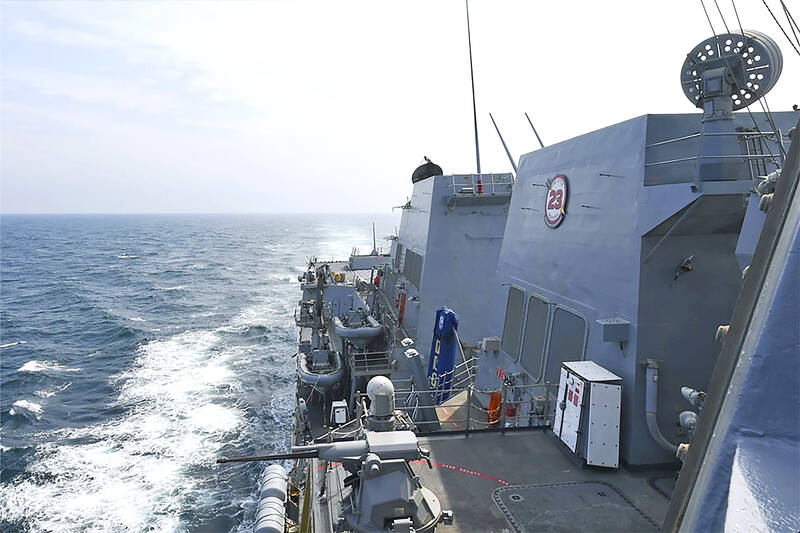Current and former US military leaders are increasingly urging Washington to abandon its long-standing policy of “strategic ambiguity” to counter Beijing’s attempts to change the “status quo” in the Taiwan Strait, Nikkei Asia reported on Friday.
“Strategic ambiguity has had its day and it’s time to move to strategic clarity,” retired admiral Harry Harris, former commander of the US Indo-Pacific Command, told the magazine on the sidelines of the Global Energy Security Talks in Tokyo.
“The Taiwan Relations Act calls for a peaceful resolution and calls for the status quo,” Harris said. “China has changed the status quo and is acting belligerently with regard to Taiwan, so that obligates us to do certain things to help Taiwan.”

Photo: Mass Communication Specialist Third-class Ismael Martinez, US Navy via AP
The act stipulates that peace and stability in the region are in the “political, security and economic interests of the US,” and that the US president and the US Congress must take “appropriate action” should those interests be put at risk, he said.
US President Joe Biden has said four times that his administration would defend Taiwan, Harris said.
“We should take him at his word. He is our commander-in-chief,” he said.
Harris’ successors as commanders of the US Indo-Pacific Command, retired admirals Philip Davidson and John Aquilino, have both testified in Congress that strategic ambiguity had served the US well, Nikkei Asia reported.
However, Commander of the Indo-Pacific Command Admiral Samuel Paparo did not defend the policy of ambiguity or use the term to describe the US’ stance toward Taiwan during his confirmation hearing earlier this year, the magazine said.
“There is no ambiguity for the joint force,” he said. “There is just the mission clarity contained within the Taiwan Relations Act that the [US] Department [of Defense] will aid Taiwan’s ability to defend itself.”
Asked if he meant preparing US regional forces under his command for “every potential,” including combat, Paparo said: “Yes sir. Clarity and mission focus.”
Separately, he told Nikkei Asia during an interview last month that the US closely observed Beijing’s military drills conducted shortly after President William Lai’s (賴清德) inauguration.
“We watched it. We took note. We learned from it. And they helped us prepare for the future,” he said.
He said he was confident the US and its allies would defeat China in a conflict.
However, Jeremy Furchtgott, director of Washington-based consultancy Baron Public Affairs and leader of the firm’s China practice, said that embracing strategic clarity risks forcing China into a corner.
“If the goal is conflict, the US should signal clarity. If the goal is to freeze the current situation, there should be ambiguity and mixed messages,” he told Nikkei Asia.

A Ministry of Foreign Affairs official yesterday said that a delegation that visited China for an APEC meeting did not receive any kind of treatment that downgraded Taiwan’s sovereignty. Department of International Organizations Director-General Jonathan Sun (孫儉元) said that he and a group of ministry officials visited Shenzhen, China, to attend the APEC Informal Senior Officials’ Meeting last month. The trip went “smoothly and safely” for all Taiwanese delegates, as the Chinese side arranged the trip in accordance with long-standing practices, Sun said at the ministry’s weekly briefing. The Taiwanese group did not encounter any political suppression, he said. Sun made the remarks when

PREPAREDNESS: Given the difficulty of importing ammunition during wartime, the Ministry of National Defense said it would prioritize ‘coproduction’ partnerships A newly formed unit of the Marine Corps tasked with land-based security operations has recently replaced its aging, domestically produced rifles with more advanced, US-made M4A1 rifles, a source said yesterday. The unnamed source familiar with the matter said the First Security Battalion of the Marine Corps’ Air Defense and Base Guard Group has replaced its older T65K2 rifles, which have been in service since the late 1980s, with the newly received M4A1s. The source did not say exactly when the upgrade took place or how many M4A1s were issued to the battalion. The confirmation came after Chinese-language media reported

The Taiwanese passport ranked 33rd in a global listing of passports by convenience this month, rising three places from last month’s ranking, but matching its position in January last year. The Henley Passport Index, an international ranking of passports by the number of designations its holder can travel to without a visa, showed that the Taiwan passport enables holders to travel to 139 countries and territories without a visa. Singapore’s passport was ranked the most powerful with visa-free access to 192 destinations out of 227, according to the index published on Tuesday by UK-based migration investment consultancy firm Henley and Partners. Japan’s and

BROAD AGREEMENT: The two are nearing a trade deal to reduce Taiwan’s tariff to 15% and a commitment for TSMC to build five more fabs, a ‘New York Times’ report said Taiwan and the US have reached a broad consensus on a trade deal, the Executive Yuan’s Office of Trade Negotiations said yesterday, after a report said that Washington is set to reduce Taiwan’s tariff rate to 15 percent. The New York Times on Monday reported that the two nations are nearing a trade deal to reduce Taiwan’s tariff rate to 15 percent and commit Taiwan Semiconductor Manufacturing Co (TSMC, 台積電) to building at least five more facilities in the US. “The agreement, which has been under negotiation for months, is being legally scrubbed and could be announced this month,” the paper said,